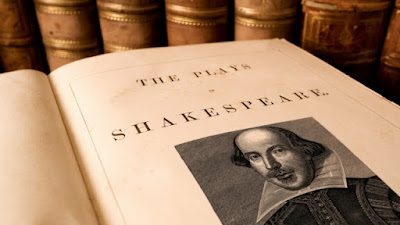Posts
Showing posts from 2018
Does Hamlet's success as a tragic hero stem from his theatrical creativity, and does Hamm's lack of success correspondingly arise from his insistence on theatrical staleness/repetition?
- Get link
- X
- Other Apps
The definition of a traditional ‘tragic hero’ originated in Aristotle’s work ‘Poetics’ where he suggests that a hero of a tragedy must evoke a sense of dread from the audience due to their own misfortune; a sense of catharsis, purging the emotions of an audience through art (Merriam-Webster's encyclopaedia of literature, 1995). The change of said fortune "should be not from bad to good, but, reversely, from good to bad.” (Butcher, Aristotle. and Aristotle., 1902) From this formula therefore, Shakespeare’s Hamlet is essentially the perfect tragic hero in the sense that he begins the play with the just intentions of avenging his father’s death using his own theatrical creativity, but by the end of the play where he decides to finally commit suicide after all the deeds he has done. This contrasts with the character Hamm from ‘Endgame’ who tries to become a tragic hero much like Hamlet yet fails in this plan as he cannot evoke the same catharsis as Hamlet can, arguably because o...
Compare and contrast the ways in which Tolkien and Wilde present the corruption of good in ‘Lord of the Rings’ (1968) and ‘The Picture of Dorian Gray’ (1890).Examine the view that everyday objects can become powerful entities.
- Get link
- X
- Other Apps
Compare and contrast the ways in which Tolkien and Wilde present the corruption of good in ‘Lord of the Rings’ (1968) and ‘The Picture of Dorian Gray’ (1890). Examine the view that everyday objects can become powerful entities. The corruption of good in both J.R.R. Tolkien’s work ‘Lord of the Rings’ (1968) and Oscar Wilde’s novel ‘The Picture of Dorian Gray’ (1890) can be clearly seen due to specific powerful objects such as the One Ring and the Painting and the influence that they then have with its capabilities to corrupt all good into a more morally ambiguous state. However, there are also ways in which the corruption contrasts according to critics such as Tolkien and Wilde having extremely different views on morality due to the different genres such as Tolkien creating a world with a much more black-and-white morality due to the fantasy setting whereas Wilde changed the conventional morality of the time with themes such as homo-eroticism involved in his work. ...
Change
- Get link
- X
- Other Apps
Ugly, vile, horrifying, repulsive, Awful, nasty, terrible, unattractive, Gross, weird, dreadful, creepy, Slag, messy, unnatural, slut Change. Gorgeous, pretty, beautiful, fine, Handsome, elegant, wonderful, sexy, Cute, attractive, perfect, precious, Fancy, adorable, heavenly, dazzling Why do we have to change?
Shakespeare Rant - To Teach or not to Teach?
- Get link
- X
- Other Apps

Ben Jonson (1572 – 1637): “Shakespeare was not of an age but for all time” . Okay let me preface this by saying, I’m not trying to force my opinion on anyone and I understand if people just simply don’t like Shakespeare, that’s fine by me, obviously people can have their own opinion and I respect that. This rant is based on a few articles I’ve recently read and a general thought that I’ve seen going around lately; should Shakespeare be taught in the classroom? Shakespeare is one of my favourite writers in both poetry and plays alike; I believe that all his works are timeless masterpieces. His work includes enduring themes in the arts such as Love, Betrayal, Death (a large amount of that) and his work was extremely revolutionary for his time also dealing with issues such as Racism and Gender fluidity. These themes are obviously still relevant today completely disregarding the argument that “Shakespeare is outdated” or “His works are no longer relevant to modern day”. Furth...
A Bard's Lament
- Get link
- X
- Other Apps
A mixture of crimson with an earthy hue formed into neat puddles inside almost artistic cracks throughout the land. Each small carving was slowly swallowed up by the rainfall that curses these parts constantly; however, this only seemed to dilute the blend spreading it further along the lonesome footpath. The eclipsed sky was bursting with an abundance of spotted lights drifting endlessly without aim or consequence. Between these little pockets of purity, nothing seemed to matter. There were no alliances that needed to be kept, no friendships begging to be respected, and with no difference seen between the souls of the wicked and that of the divine. The full moon shone new light over what had previously been hidden, and creatures darted from one miniature piece of woodland to the next, seeking shelter from the unforgiving storm. Kind animals hopped from one natural umbrella to another managing to hide their innocence and majesty. This small snapshot of the world reminded him more of t...